Human Rights
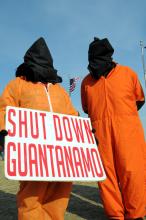
PUBLIC PRESSURE IS finally building on President Obama to fulfill his promise to close the Guantanamo prison, which still houses 166 miserable leftovers from the Bush-Cheney “war on terror.” That pressure is well-placed. Gitmo has been a disaster from the beginning. Christians and other people of faith must join in calling for its closure.
Detainees were originally shipped to Gitmo in the vain hope of avoiding the reach of the U.S. judiciary. In this sense Gitmo was conceived in Constitution-evading sin. The Supreme Court rejected the evasion in 2006, but the damage was already done.
Some of the detainees brought to Gitmo were tortured. This has been confirmed by numerous sources, including a leaked 2006 Red Cross report and the 577-page report of a bipartisan blue-ribbon detainee panel organized by The Constitution Project, on which I served.
More than half of the remaining detainees have been cleared for release, but for domestic and geopolitical reasons they continue to be held. More than 100 of them are currently on a hunger strike, with dozens being force-fed, a practice that violates both American Medical Association and World Medical Association standards and which our Detainee Task Force condemned unequivocally.
Some detainees cannot be tried because the evidence against them was obtained by brutal or torturous means and is tainted or would be embarrassing to the U.S. Others are slated for trials in novel military commissions whose legal problems are so severe that they have not proceeded. Civilian trials on U.S. soil were blocked in 2009 by a fearful, recalcitrant Congress. So 166 men are held in limbo indefinitely, without trial and without foreseeable prospect of release. This is unconstitutional and a violation of the most basic legal and human rights.
The Supreme Court decisions on gay marriage, while historic, didn’t settle the issue. In fact, they fuel it.
For President Obama, the repercussions of Wednesday’s ruling striking down part of the Defense of Marriage Act will mean review and revisions in hundreds of federal laws. In everything from Social Security checks to Pentagon benefits, gay married couples now must be treated the same way as heterosexual couples.
For gay rights advocates, the twin decision that opens the door to resume same-sex marriages in California bolstered determination to expand the right to wed for gay men and lesbians. The Human Rights Campaign set a goal to achieve that in all 50 states within the next five years.
The twin Supreme Court rulings on Wednesday that further opened the door for gay marriage in the U.S. were not entirely unexpected, and the condemnations from religious conservatives angry at the verdicts were certainly no surprise either.
So the real question is what gay marriage opponents will do now.
Here are four possible scenarios that took shape in the wake of Wednesday’s developments:
The first thing I did when I read the U.S. Supreme Court’s decisions in the cases involving the Defense of Marriage Act and California’s Prop 8 on Thursday morning was offer a silent prayer.
It was short — just two words — completely heartfelt and probably far more eloquent than anything I’ll manage to write in this space today.
“Thank you,” I told God.
Religious leaders from across the country revealed their thoughts on yesterday’s DOMA and Prop. 8 decisions. Stating both good and bad opinions, religious leaders touched on various viewpoints and shared examples of how yesterday’s decisions will affect the future of religion across the United States. USA Today reports:
Religious leaders on opposing ends of the gay-marriage debate alternately referred to Wednesday as a tragic and a celebratory day after the Supreme Court's decisions on two same-sex marriage cases.
But the traditional religious opponents of gay marriage remained steadfastly against the rulings, condemning them as far reaching and inconsistent with religious principles.
Read more here.
“DOMA is dead.”
Such were the chants heard outside the United States Supreme Court yesterday when it was announced that the highest judicial body in the nation voted 5-4 to strike down the Defense of Marriage Act (DOMA). That’s right. As of yesterday, there is no longer a federal law defining marriage as a union between a man and woman.
Of course, not every American is roundly rejoicing. Responses from the Christian community, which has become more divided over the issue in recent years, are mixed. Conservative Christians seem mostly despondent while the progressives among them are mostly celebrating. I spoke with several prominent Christians from across the political spectrum today to get their reactions to the Court’s decision:
Sometimes a court opinion is more than just a court opinion.
Justice Anthony Kennedy’s 26-page decision Wednesday striking down a federal ban on same-sex marriages offers a window into Americans’ rapidly shifting views of same-sex relationships — a shift that increasingly relies on matters of law and fairness, not moral or religious views.
At the same time, Justice Antonin Scalia’s biting 26-page dissent in United States v. Windsor reflects a set of cultural, religious, and social arguments that are losing ground in the court of public opinion and now, in the highest court of the land.

This week the U.S. Supreme Court is expected to hand down decisions on two significant cases for same-sex marriage: United States v. Windsor (regarding the Defense of Marriage Act, or DOMA), and Hollingsworth v. Perry (regarding California’s Proposition 8).
At the Supreme Court this morning, an expectant crowd gathered hoping to catch the decisions firsthand. Most in attendance were visibly supportive of same-sex marriage, and many were cautiously optimistic that the Court would strike down DOMA, Proposition 8, or both.
See our slideshow and interviews with those gathered at the Supreme Court, below.

After almost 40 years, Exodus International is closing its doors. It was the oldest Christian services group of its kind and a market leader in reparative/ex-gay/sexual orientation change therapy.
It harmed countless people, not just those in the programs but also their families, friends, and communities. Exodus took a heavy toll emotionally, spiritually, and physically. Too many end their lives feeling hopeless and alone because of homophobia and rejection.
Throughout its tenure, Exodus claimed its professionals and programs could “heal” people of homosexuality. They were successful in enrolling eager clients.
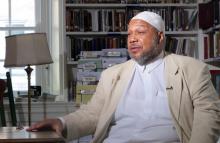
Imam Dayaiee Abdullah never knows how many people are going to show up for Friday prayers.
Some weeks, nearly a dozen men and women gather at a Quaker hall in northwest Washington, D.C., where they kneel on prayer rugs laid out to transform the room into a Muslim place of worship.
Other weeks, Abdullah, a convert to Islam, sits alone.
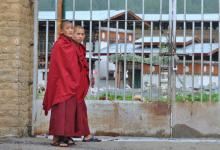
The South Asian nation of Bhutan has been rocked by a sexual abuse scandal in which young Buddhist monks molested by older monks fled their monastery and reported the abuse to journalists.
While rumors about child sexual abuse in monasteries have swirled around this tiny Buddhist nation for a while, this is the first time confirmed cases of underage monks molested by their seniors have come to the fore.
“Every time I tried to scream or struggled, he pinned me with his body, put his hand over my mouth and covered it tightly,” an 11-year-old boy told the magazine The Raven describing how he was sexually abused by a 20-year-old monk in a monastery in Punakha, about 45 miles northeast of the capital city of Thimphu.
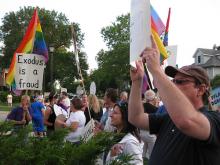
Exodus International, a group that bills itself as “the oldest and largest Christian ministry dealing with faith and homosexuality,” announced late Wednesday that it’s shutting its doors.
Exodus’s board unanimously agreed to close the ministry and begin a separate one, though details about the new ministry were unavailable at the time of the organization’s press release.
The announcement came just after Exodus president Alan Chambers released a statement apologizing to the gay community for many actions, including the organization’s promotion of efforts to change a person’s sexual orientation.
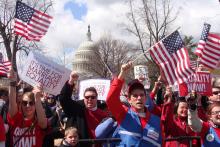
If the range of possible Supreme Court rulings on gay marriage this month requires a scorecard, the potential confusion arising from those decisions may demand a manual.
It’s not as simple as whether gays and lesbians can marry, and whether they become eligible for federal benefits. The two decisions are likely to create new questions for couples in civil unions and those who move between states, as well as for employers.
As a result, what’s already a complex situation for many gay and lesbian couples could get more complicated, at least initially, said John Culhane, a law professor at Widener University’s Delaware campus and co-author of Same-Sex Legal Kit for Dummies.

We all know that when it comes to the acceptance of LGBT folks, religions differ. But what the religions communicate, and how the people in the pews actually feel, are not the same.
In a word, the rank and file tend to be more accepting than the leadership. What’s striking is how much this LGBT Gap varies from religion to religion, and we can get some idea of the variance from Pew’s new survey of LGBT Americans.
As the measure of institutional messaging, we will use the percentages of LGBT people who say a given religion is unfriendly to them. These range from 84, 83, 79, and 73 percent for Islam, Mormonism, Catholicism, and Evangelicalism to 47 and 44 percent for Judaism and Mainline Protestantism. Then there is the proportion of members of each religion who believe that “homosexuality should be discouraged by society.” That’s 45, 65, 20, and 59 percent for the first four groups; 15 and 26 percent for the last two.
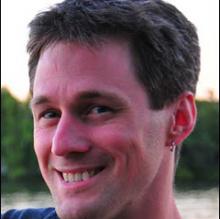
Gay Americans are much less religious than the general U.S. population, and about 3-in-10 of them say they have felt unwelcome in a house of worship, a new study shows.
The Pew Research Center’s study, released Thursday, details how gay, lesbian, bisexual, and transgender Americans view many of the country’s prominent faiths: in a word, unfriendly.
The vast majority said Islam (84 percent); the Mormon church (83 percent); the Roman Catholic Church (79 percent); and evangelical churches (73 percent) were unfriendly. Jews and nonevangelical Protestants drew a more mixed reaction, with more than 40 percent considering them either unfriendly or neutral about gays and lesbians.

A campaign to hold former Pope Benedict XVI responsible for crimes against humanity floundered on Thursday as the International Criminal Court in The Hague threw out a case filed by victims of clergy sex abuse.
The case had been presented in September 2011 by SNAP, the Survivors Network of those Abused by Priests, and the New York-based Center for Constitutional Rights, accusing the pope and other senior Vatican officials of failing to stop abusive priests.
According to a SNAP statement, the court’s prosecutor’s office said on May 31 that the file presented against leaders of the Roman Catholic Church does not meet the “preconditions of the court” and thus “do not appear to fall within the (court’s) jurisdiction.”

Southern Baptists overwhelmingly voted Wednesday to stand with churches and families that drop ties with the Boy Scouts of America over its decision to allow openly gay Scouts, and urged the BSA to remove leaders who supported the change in policy.
Members of the nation’s largest Protestant denomination, gathered on the final day of their annual meeting in Houston, also acknowledged the right of churches to remain in Scouting, urging them to “seek to impact as many boys as possible with the life-changing Gospel of Jesus Christ.”
While expected, the Baptists’ resolution stopped far short of calling for an all-out boycott, as they did in 1997 with the Walt Disney Co. to combat what they saw as the company’s gay-friendly policies. That boycott was ended in 2005.

What does the ancient arrangement of tents in an ancient Israelite encampment have to do with the ultramodern question of whether the U.S. government should be peering into the ultramodern phone and Internet records of hundreds of millions of Americans?
Or to put it another way, are there any spiritual and religious roots to the notion of personal and household privacy?
To start from the Bible: Many Jewish prayer services begin with a quotation from a non-Jewish shaman, himself quoted in the Torah (Num 24:5 — this passage of Torah will be read two weeks from now, on June 22.) There was a king, Balak by name, who hired an expert shamanic curse-hurler, Balaam, to curse the People of Israel who were swarming across the wilderness after their liberation from slavery under Pharaoh.
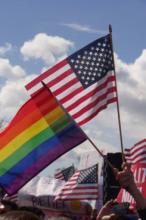
Houston lawyer Mitchell Katine came to the Supreme Court 10 years ago for the final chapter of Lawrence v. Texas, the landmark gay rights case in which the justices struck down state sodomy laws.
Neither Katine nor the other lawyers working for John Lawrence and Tyron Garner in their battle against Texas’ sodomy law imagined the length and breadth of Justice Anthony Kennedy’s majority decision, which struck down all remaining state sodomy laws.
As the Supreme Court prepares to issue two historic decisions on gay marriage this month, however, the judges and lawyers who worked on both sides of those earlier cases don’t expect anything quite so eloquent or all-encompassing from a cautious and conservative court.
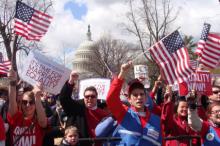
About 72 percent of Americans say legal recognition of same-sex marriage is “inevitable,” according to a survey released Thursday.
Of those who support same-sex marriage, about 85 percent say it is inevitable, says the Pew Research Center’s survey. About 59 percent of opponents also say it is inevitable.
“As more states legalize gay marriage or give equal status, the question in our minds was how the public sees the trajectory on this issue,” said Michael Dimock, the report’s lead author and director of the Pew Research Center for the People and the Press. “Do they see a future in which gay marriage is going to be the rule, not the exception, in American society?”